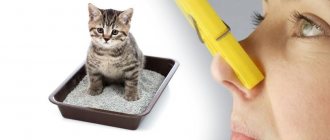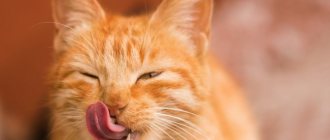If your cat's urine smells like ammonia, this may be a sign of a serious inflammatory disease or hormonal imbalance. You should not ignore this problem and try to fix it yourself. To make an accurate diagnosis, it is enough to take blood and urine tests of the kitten. Therapy for disorders includes medication and a balanced therapeutic diet.
Reasons for appearance
Under normal conditions, cat urine has a strong odor. This specific aroma is caused by a mixture of ammonia and secretion from the gonads. But sometimes you can feel that the smell has changed from normal to ammonia. A common cause is considered to be dehydration. This happens in animals that eat only dry food and do not have access to water. Another popular reason why a cat’s urine stinks is considered to be the onset of sexual heat. These are non-pathological changes that occur after sterilization or completion of active sexual activity.
Veterinarians say that in domestic cats, the ammonia smell in urine appears due to an inactive lifestyle. This happens due to the fact that with a lack of activity, metabolism deteriorates, and this leads to the sedimentation of sand in the kidneys, and affects the condition of the pet’s biological fluid.
Sometimes the smell of an animal's urine changes due to stress.
A castrated cat's urine smells due to inflammatory processes in the urethra. This occurs because fluid accumulates, forming a urethral plug. Then microorganisms begin to develop in it, which cause such a stench. If, in addition to ammonia, the smell of rot is clearly heard, then the reason lies in hormonal imbalances or cancer. The aroma also changes under the influence of stress, but this is not a serious disorder, and the problem goes away on its own.
Smelly urine in a cat appears due to reasons such as:
- diabetes;
- hypothyroidism;
- hypothermia;
- infection of the oral cavity;
- poor nutrition.
If the cat just marks and walks past the litter box
The owner should understand that just like that, for no reason, a well-mannered and litter-trained pet does not start crapping in undesignated places. Animals do not harm their owners due to their harmful nature. Therefore, if your pet begins to do its business past the tray, you should understand the reason for this behavior.
Most often this occurs due to stress and diseases of the genitourinary system. Sexually mature cats often mark things, walls, shoes, furniture and urinate past the litter box, thus marking their territory. If there is a stress factor, on the recommendation of a doctor, you can give the animal plant-based sedatives - “Fitex”, “Cat-bayun”.
To correct your pet’s behavior, you can use special products that stop you from shitting anywhere: Himola spray, Antigadin, Nature’s Miracle and others.
An attentive and responsible owner, if a pet has a strong smell of urine or a change in behavior (the animal urinates past the tray), will take the necessary measures to determine the causes of this phenomenon. A timely visit to a veterinarian will help to exclude the disease or confirm the diagnosis and prescribe effective treatment if the cause of the bad smell from the litter box is the pet’s illness.
If a cat goes to the toilet in an apartment, the owner can easily notice a change in the smell of the pet’s urine. When a cat’s urine smells strongly, it is worth determining why this phenomenon occurs, since it almost always indicates problems in the animal’s health and the need for proper and comprehensive therapy.
Only a veterinarian can accurately determine the reason why a cat’s urine stinks, who, after conducting a full examination of the cat, will identify any health problems he has and prescribe therapy. It is important to remember that it is unacceptable to postpone a visit to a specialist, since if a cat has particularly smelly urine, it can be caused by a serious pathology; without providing the cat with the necessary help, you can lose your pet.
© shutterstock.
[custom_ads_shortcode3]
Associated symptoms
The main sign of the disorder is cloudy urine in the cat. This is a symptom of a malfunction in the urinary system. Sometimes the liquid smells fishy or rotten. The pet often goes to the litter box to no avail. His behavior changes: he becomes restless, loses his appetite, although some cats, on the contrary, become sleepy and passive. If the changes were caused by dehydration, then the pet quickly loses weight and does not gain weight, although the diet does not change. There may be incontinence or pain when urinating.
Should a healthy cat smell?
Nature took care of the hunting cat and provided for the absence of smell. “Washing” the cat is of great importance. Animal saliva contains lysozyme. This is an enzyme that, when contacted by microorganisms, immediately destroys their membranes.
The smell of flesh is the smell of microorganisms. It is they who, by multiplying, reveal their presence. The higher the population, the stronger the odor emanating from the microbe's breeding site. By destroying the microflora on itself, the cat normalizes it and prevents reproduction.
The cat washes itself often because the enzyme is very unstable. When it comes into contact with air, it quickly breaks down and must be applied again and again. If a cat feels good, it will not be lazy. Constant washing is a guarantee that there will be no odor.
Diagnostic methods
The reason for this odor in urine can be determined using standard biochemical studies.
In most cases, it is enough to do biochemical tests of urine and blood to determine the disease in a cat. To identify malignant formations or inflammatory processes in the genitourinary system, ultrasound or contrast radiography is performed. Blood pressure measurements or biopsies are rarely ordered.
Healthy feeding rules
The cat is a carnivore. The basis of the diet should be animal feed:
- meat;
- fish;
- eggs;
- dairy products.
Practice shows that constant feeding of dry food, even the most “promoted” brands, does not add health. Among these “eaters” there are no long-livers. Humans are not yet able to select an animal’s diet with molecular precision so that it is balanced by:
- natural proteins;
- carbohydrates;
- fats;
- minerals;
- vitamins.
What to do?
When choosing therapy, it is worth considering the age, sex of the animal and stage of the disease. Often, with diseases of the urinary system, it is impossible to completely cure a cat. This is due to the fact that symptoms often appear late and pet owners seek advice from a veterinarian when the disease has passed the first stage of development. But if you follow all the doctor’s instructions and start the selected therapy in a timely manner, long-term remission can be achieved.
Medications
If a cat is diagnosed with dehydration, then intravenous use of saline solutions is prescribed. For inflammatory diseases, the doctor prescribes antibiotics. To improve the removal of stagnant fluid in the body, diuretics are used. But such drugs should be selected individually for each pet. To maintain the general condition of the body, vitamin therapy is used. If the source of why a cat stinks of urine is severe stress, then veterinarians will prescribe herbal-based sedatives. Such drugs include Fitex and Kot Bayun. In severe cases, surgery is used. If the cat's urine begins to smell unpleasant due to sexual heat, then doctors recommend resorting to castration.
What to feed your pet?
Sometimes, to solve the problem, it is enough to switch the animal to a higher quality diet.
If the cat’s urine begins to smell strongly, but the diagnosis did not reveal any pathological changes in the body, then the cause of the unpleasant smell of ammonia in the urine lies in poor diet. In addition, a balanced diet is important for regaining health after drug treatment. Doctors advise using special high-quality feed. It is advisable not to mix them with fresh products. The following brands are recommended:
- Royal Canin;
- Hills;
- Acana;
- Purina Proplan;
- Eukanuba.
If your pet eats natural foods, you should remember that the diet should be varied. The pungent odor of urine disappears after the balance between carbohydrates and proteins in food is restored. In addition to meat and fish, food includes cereals (buckwheat or rice porridge), vegetables (carrots, zucchini). To improve the activity of the gastrointestinal tract, dairy products are included in the diet: cottage cheese, kefir, yogurt. It is not recommended to give your cat canned, smoked or pickled foods. An adult animal or kitten must have constant access to clean water.
Diet adjustments
If the reason why the cat's urine has a strong smell is nutrition, the owner should reconsider the diet. When choosing concentrated feeds, you should give preference to premium and super-premium feeds from well-known manufacturers:
Premium cat food It should be remembered that such food is not recommended to be mixed with natural food.
If the animal eats natural food, then to normalize protein metabolism, the consumption of foods such as chicken, raw meat, offal, and fish should be reduced. Feeding only proteins has a negative impact on liver and kidney function. Your pet's diet should include vegetables (carrots, cabbage, zucchini) and cereals (buckwheat, rice, rolled oats).
It is useful to give the animal fermented milk products: kefir, cottage cheese, low-fat cream, yogurt. This improves the functioning of the gastrointestinal tract and kidneys. Under no circumstances should you feed your cat food from the table (sausages, canned food, pasta, soups, etc.).
d.).
[custom_ads_shortcode1]
How to remove the smell?
An unpleasant aroma on furniture can be easily removed with a prepared vinegar solution.
To remove the smell of cat urine from furniture, use a vinegar solution. It is diluted in a ratio of 1 to 3 and applied to objects. If your clothes stink, use Belizna bleach. This product is also used to clean cat litter. To reduce the smell, use lemon juice or citric acid. To combat the pungent odor of urine from kittens or adult cats, sprays are applied to objects: “Himola”, “True Friend” or “Laina”.
When to contact a veterinarian
Considering that a healthy animal does not smell, any smell that is unusual for the owner should be the reason for a visit to the veterinarian.
You cannot debug a visit for a long time. Microflora develops very quickly. Purulent processes tend to end in sepsis and death of the animal.
You should consult a doctor immediately if:
- the animal is oppressed;
- elevated body temperature was recorded;
- the cat shows aggression and constant interest in the problem area;
- inflammatory purulent processes were found on the skin;
- the smell is “smelled” from the nose and other symptoms quickly join it;
- the cat shakes its head, discharge and an unpleasant odor are visible;
- prenatal processes are not typical with a foul odor;
- postpartum discharge is profuse and there is a stench;
- the anus is inflamed and smells unpleasant.
When contacting a doctor, laboratory and clinical examinations will be performed.
If necessary, the doctor will prescribe:
- dermatological shampoos;
- antibiotics;
- ear drops;
- change of diet;
- surgical intervention.
Prevention
To maintain health, it is important to follow the correct diet: protein foods should be combined with carbohydrates. The cat should always have access to water, especially in the hot season. It is advisable to monitor the cat’s behavior and notice the slightest changes in its character. This will help to detect the development of the disease in time. It is also worth protecting the animal from stress: do not leave your pet alone or with strangers for a long time, carefully transport it from place to place. If your cat's urine smells strongly, you should immediately contact a veterinarian. After treatment, the pet must undergo scheduled checks every six months.
Hygiene rules for cats
A healthy cat takes care of itself. She spends a third of the day on this. However, the owner is also obliged to take part in this.
Cat hygiene consists of caring for:
- skin and hair. This includes bathing, combing while simultaneously examining and palpating the skin. To do this, you can use special shampoos and foams, combs and comb mittens. (For long-haired ones, you need a set of different combs). The animal should be bathed 2 times a month; hairless breeds that sweat profusely in summer should be bathed daily. If the animal is unwell, bathing is not used. You need to comb it 2 times a week (daily during the molting period);
- ears . They should be cleaned with a cotton swab dipped in warm water or zoo lotion. Using smooth movements and turning the swab clockwise, you can easily clean your cat's ears. If the accumulation of dirt is large, dry and old, then you can drop a few drops of lotion, sunflower oil or water into the cavity. The animal will shake out the excess, and what remains will soak the crusts. Next, you can use a cotton swab. The hygiene procedure is carried out once a week;
- oral cavity. The removal of stones and plaque should be carried out by a specialist in the clinic. For prevention, the cat should be given solid food and allowed to chew on soft bones and cartilage.
Products for removing cat urine from different surfaces
In order not to spoil things when cleaning, you should figure out how and with what to clean certain surfaces.
Carpets.
Sprinkle the stain with baking soda and citrus juice and wipe. Do not touch for a couple of hours. Next, clean with clean water.
Sofas, armchairs.
Apply a weak solution of potassium permanganate to the stained area, then add a little crushed laundry soap. Remove after an hour. Iodine is suitable for upholstered furniture in dark shades.
Laminate or Linoleum.
Make a solution of vinegar and water, in a ratio of one to one. Apply to the stained area on a rag and leave until completely dry.
Tree.
Apply a couple of tablespoons of baking soda for 30 minutes, then remove and apply grated laundry soap. Remove after 60 minutes.
Plants.
Place the flower in the sink and then pour 1 liter of warm water into it, in which an activated carbon tablet is diluted. Pour this water through the flower. Let it drain and return the plant to its place.
Bed linen and mattresses.
Rinse the area of contamination with mineral water and sprinkle with salt. After two hours, put the laundry in the wash along with one spoon of vinegar.
What is the norm?
A good place to start is to look at the normal urine values (physical and chemical) of a normal, healthy adult cat. You don't have to be an expert to spot abnormalities, especially when it comes to why your cat's urine smells strong.
In a healthy animal, the urine is homogeneous, liquid, transparent, but in no case cloudy; The color is bright yellow, comparable to the color of straw. The smell is pungent, ammonia-like, into the nose. The fact is that the liquid contains ammonia derivatives. Also, sexually mature individuals secrete corresponding secretions that attract the opposite sex. If a cat relieves itself too rarely in small quantities, this is a signal that it has some problems. The same can be said about frequent visits to the tray with an extremely copious amount of fluid secreted. We pay attention to the regularity and amount of precipitation.
The Science Behind the Stench
When you "sniff" you may be wondering why cat urine smells so bad. It's not the urine itself that smells (although it can in some cases), but the fact that some cats may not urinate in the litter box, but rather on the carpet, in a corner, or anywhere else. Once the urine is absorbed into the object and begins to decompose, the bacteria in the urine release a typical characteristic odor.
Also, the second stage of decomposition of liquid urine waste is mercaptans (that's the bad smell that comes from skunks), so the longer the decomposition process takes (without treatment), the more mercaptans will be produced.
© shutterstock
Why does my cat's urine stink?
There are many reasons why stench occurs. And they, as a rule, can be traced to one degree or another in any pet and appear over time. Even a once healthy, cheerful and cheerful pet can at any time encounter such an illness.
Puberty
It is absolutely normal for any animal to secrete special fluids that scare off other representatives of the same sex (the so-called marking of territory) and to attract the opposite. Of course, due to the fact that the reproductive and excretory systems are very close to each other, it is likely that these secretions enter the urine and are excreted along with it. Often cat pheromones have a specific odor that seems extremely unpleasant and disgusting to us humans.
Lack of fluid (otherwise known as dehydration)
The connection between the condition of urine and the amount of water consumed is obvious. Animals also have their own water consumption per day. If you do not adhere to it, then the concentration of all kinds of substances (including salts, ammonia and other chemical compounds) will increase. As a rule, it is because of this phenomenon that we wonder why a cat’s urine smells like ammonia. It's simple: a lack of water in a liquid increases the concentration of its other components, which do not decrease (that is, the kidneys filter the amount of breakdown products that is in the body, regardless of the volume of water drunk).
Problems with the genitourinary system
Of course, we cannot dismiss the possibility that there is some kind of disease in the animal’s genitourinary system. Even indoor cats and cats are susceptible to them. As a rule, most often pets suffer from inflammation of the excretory organs (kidneys, urinary canals and ducts), while cats can suffer from standard “male” ailments - these are all kinds of urethritis, pyelonephritis and other “charms”. In this situation, you definitely cannot do without the help of a doctor - who knows how inflammation of the reproductive and excretory systems of the body may end.
Poor nutrition
Improper nutrition for animals is a vast topic of discussion. Mainly, it is worth noting several main points that experienced doctors most often stumble upon:
- feeding pets with cheap food with poor quality composition and poor raw materials (our notorious Whiskas, Felixes, Kitikat and other popular brands);
- excess meat products in the diet (protein is not completely absorbed by the body, and its residues, due to the nitro group contained, become ammonia, which is the cause of unpleasant odors);
- unbalanced, meager and monotonous diet (the diet of domestic animals, just like ours, must be varied in order to satisfy all the needs of the body).
Watch a video about the general principles of feeding cats.
It has been established that feeding animals only dry food will not lead to anything good. In order for everything to be okay with your pet, you need to diversify its menu with milk and dairy products and vegetables. Then the question of why cats’ urine stinks will immediately disappear.
Read about how to get rid of urine odor in your dog. And also how to get rid of the unpleasant smell of your baby’s urine.
Other reasons
In addition to this, there are other reasons why a cat’s urine smells like ammonia. Don’t be surprised by the list below; cats can also experience emotional experiences that seem to be characteristic only of humans:
- stressful situations, bad attitude and dislike from the owners;
- diabetes;
- tumors, obesity;
- problems with the thyroid gland.
What to do and how to treat this disease?
As soon as the appropriate symptoms, signs and causes of unpleasant cat urine odors have been noticed, action must be taken immediately. The sooner the owner begins to take active steps, the sooner his beloved pet will be able to continue a healthy and active life again.
As a rule, this problem is solved quite simply. Often the cause of an unpleasant stench is precisely the secretion secreted to attract the opposite sex, so you just need to castrate your pet. This will get rid of a huge list of problems associated with cats.
Why does my cat's urine stink after castration?
If sterilization does not help, then the animal should change its diet and give more fluids. If this does not give any results, then there is only one way out - a trip to the veterinarian. Only a competent specialist will be able to accurately diagnose and give recommendations for solving the problem.
If your cat's urine smells like ammonia, this may be a sign of a serious inflammatory disease or hormonal imbalance. You should not ignore this problem and try to fix it yourself. To make an accurate diagnosis, it is enough to take blood and urine tests of the kitten. Therapy for disorders includes medication and a balanced therapeutic diet.











